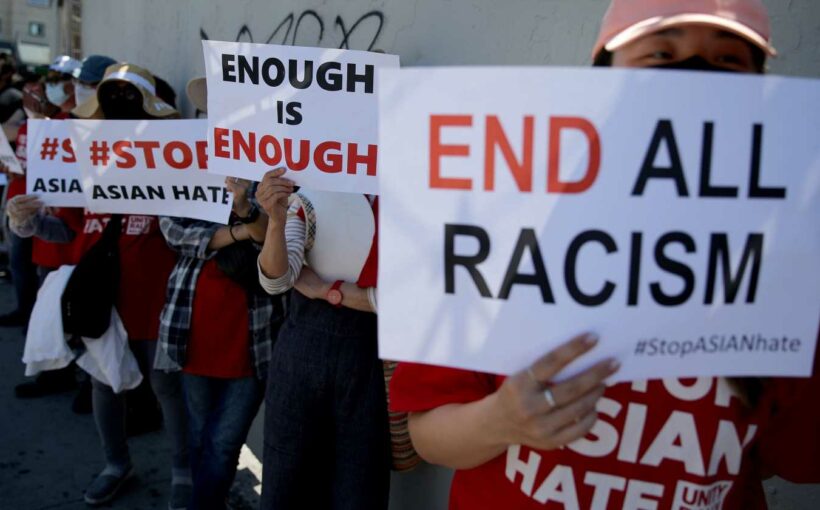After a year of chafing and muttering about it to myself, I am ready to say this out loud. I am refusing the acronym BIPOC. I am taking it out of my mouth. I’m laying it down. I am recommitting to the much maligned term “people of color.” I’m not doing this because I’m old-fashioned or politically retrograde. As a Black woman who loves Black people, I am acutely aware of the unique and specific ways that racism harms Black people. I’m refusing BIPOC to reclaim a strength: the political power of solidarity.
BIPOC – an acronym for Black, Indigenous and other people of color – was part of how we talked about race during the COVID-19 spring of 2020. The term was useful to bring focus to the deadly experiences of oppression faced by Black and Indigenous people. Although some people didn’t like it or didn’t understand it, the term BIPOC filled the streets with multiracial rage about the murder of George Floyd and anti-Black policing. BIPOC reminded us to open our Zoom with acknowledgements that wherever we are, we are on Indigenous land.
COVID, Trump sparked anti-Asian hate
But another racial pattern was also emerging that spring. World leaders, including then-President Donald Trump, used the pandemic to revive racist stereotypes of Chinese people as sources of disease. Economic boycotts of Asian-owned business soon followed. Then newspapers began to report physical attacks on individuals of Asian and Pacific Island heritage as hate crimes.
In the middle of a national uprising against racism, it took another year and the mass killing of six Asian women before we paid serious attention to racism expressed as anti-Asian hate.
Demonstrators on March 27, 2021, in Los Angeles. (Photo: Mario Tama/Getty Images)
Certainly, many grassroots organizers mentioned individual attacks as examples of white supremacy. But there was no consistent frame that integrated individual hate crimes against Asian Americans and Pacific Islanders into the larger picture of structural racism and anti-colonialism that our nation was revolting against.
Fighting back: With new hate crimes bill, Asian Americans take a sledgehammer to insulting stereotypes
In moments like these, words matter. They shape what we can imagine. The phrase “people of color” was created by Black, Latina, Asian and Indigenous women who had to invent new language to describe their political coalition in the face of white feminism.
Words can invent, words can destroy. There are real-world consequences to the words we choose. In a moment of intense white backlash, our cutting-edge discourse about ending white supremacy used a word that marginalized Asian Americans and Pacific Islanders into the racialized stereotype of “other,” even among people of color. “BIPOC” inadvertently replaced the power of solidarity with a comfortable, familiar racial hierarchy.
Move past BIPOC to show solidarity
Legendary scholar/artist/activist Bernice Johnson Reagon wrote: “If you’re in a coalition and you’re comfortable, you know it’s not a broad enough coalition.” People of color is not a racial identity but a political one. It describes a tenuous, deeply uncomfortable state of coalition held together by the knowledge that it will take all of us standing together to wear down and tear down the structures of white supremacy.
Refusing BIPOC means when I write about the shared experience of the multiethnic, multinational group of people of African descent, I will talk about Black people. When pointing to the ongoing harms of settler colonialism, I will specify Indigenous people and Indigenous land. But when I want to describe an alliance that includes people from every group that is racialized and subjugated to keep white supremacy alive – people of African, Indigenous, Latinx, Asian, Pacific Islander and Arab heritage – I will talk about people of color.
Targeted: Stand together to fight anti-Asian hate. We all have a stake in a more inclusive America.
Refusing BIPOC means I keep the wisdom this term sought to elevate – that there are moments when we must focus our attention on how people are experiencing specific forms of racial harm. Reclaiming “people of color” frees me to act in solidarity with my Asian American Pacific Islander sisters without explanation in these brutal times.
Mistinguette Smith is the executive director of The Black/Land Project and a 2021 Encore Public Voices Fellow with The OpEd Project. Follow her on Twitter: @MistinguetteS
You can read diverse opinions from our Board of Contributors and other writers on the Opinion front page, on Twitter @usatodayopinion and in our daily Opinion newsletter. To respond to a column, submit a comment to [email protected].
Source: Read Full Article

